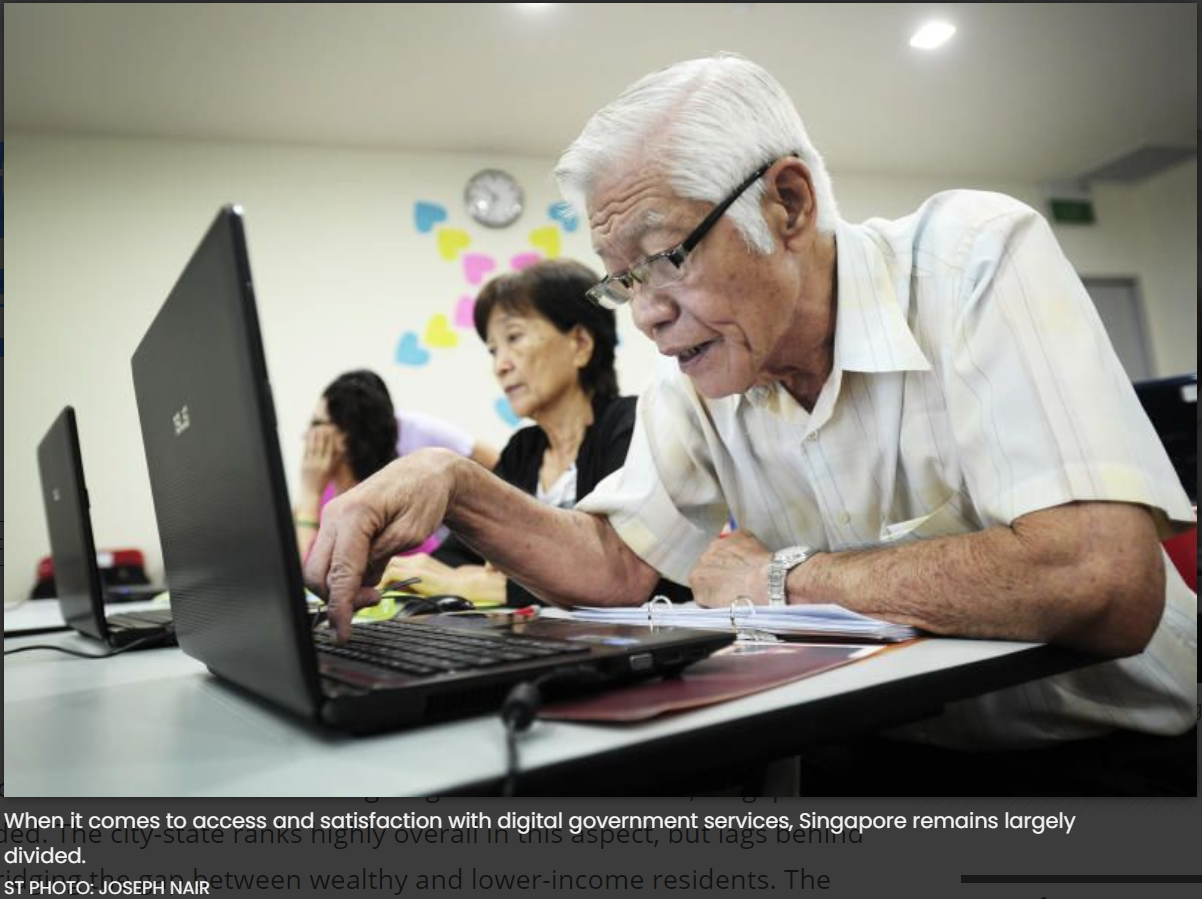It’s time to mind the gap in Singapore’s rich-poor digital divide: report
WHEN it comes to access and satisfaction with digital government services, Singapore remains largely divided. The city-state ranks highly overall in this aspect, but lags behind its global peers in bridging the gap between wealthy and lower-income residents. The government will also need to address issues of trust in data management.
Singapore’s digital divide – in terms of income – is wider than its global counterparts. Only 42 per cent of Singapore’s lowest-income households (below the 10th percentile) have their needs met by online government services, despite having the lowest expectations, a report by the Boston Consulting Group (BCG) has found.
Digital government services include resources like the TraceTogether app, and online platforms such as the LifeSG app – which allows users to apply for a passport, register a birth and find advice for skills training. BCG’s analysis revealed that this group experienced 50 per cent more problems than the highest income group in required services not being available online.
In contrast, 66 per cent of higher-income households (above the 10th percentile) surveyed reported that their needs have been met. The 36 percentage point contrast ranks higher than the 22 percentage points in China, or 19 percentage points in the US.
Overall, the city-state managed a 76 per cent net satisfaction score, ranking fourth out of 36 countries assessed, based on satisfaction with 26 different digital government services. This was higher than its peers in Canada, France and the US, but lagged behind China, India and Estonia.
However, the report found that Singapore’s lowest-income group (those with annual household income below S$12,000, fifth percentile) were 30 per cent less satisfied than their high-income peers (those earning over S$124,000), despite using government services at a similar rate. Satisfaction in digital government services among Singapore’s lowest income group was the worst among any income group in Singapore.
Trust is another issue in the digital divide. The lowest income group evidenced by far the least satisfaction in areas of security, transparency and communication of benefits, according to the BCG report. Just 66 per cent of the lowest income group trusted that their personal information would be safe from hacking, compared to 82 per cent in the highest income band.
Only 69 per cent of the lower income group noted a belief that personal information would not be used for any purpose other than which it was collected, compared to 84 per cent for the highest income group. This reveals a clear gap in relative trust of digital government services between these two income groups.
The question of trust in digital government services is a particularly timely discussion, considering recent revelations around how data collected under Singapore’s TraceTogether programme to track Covid-19 contacts may be used for criminal cases too. This comes despite previous reassurances around the siloed use of data.
Despite moves by the government to ring fence the use of data, these revelations have “raised fresh concerns” among citizens, and highlighted the “fragile yet critical importance of transparent data management and its communication”, said the report. “These interventions are at greater risk of causing dissatisfaction amongst the lowest income groups.”
Another sore point was that older dwellers were also less satisfied and had more pain points with the city-state’s digital government services. The youngest and oldest groups revealed “contrasting and potentially hard-to-please priorities and pain points”, noted the report.
The younger demographic – aged 18 to 34 – expressed dissatisfaction around ease of use and convenience of platforms; while the oldest group – over 60 years – were least satisfied with availability of real-time support and assistance provided for service use.
Global analysis indicates that when such a divide exists, and satisfaction between elderly and youth worsens in particular, a country’s total satisfaction with digital government services is likely to decrease. This reveals the importance of acting early to bridge such a gap and tackle the issue of divergent satisfaction levels before they undermine overall performance, the report noted.
If Singapore is to achieve this goal, it will need to recognise, and address, the two key areas of digital divide – in income and in age.
• Income divide. Ensure appropriate provision of desired digital government services while promoting the benefits and reinforcing trust and transparency in management of data submitted to digital government services.
• Age divide. Address questions of user-friendly service provision raised by the youngest age groups, while at the same time working to tackle the parallel concerns of real-time support, assistance and transparency raised by the oldest demographic.
Source: https://www.businesstimes.com.sg/garage/its-time-to-mind-the-gap-in-singapores-rich-poor-digital-divide-report


 Thailand
Thailand




